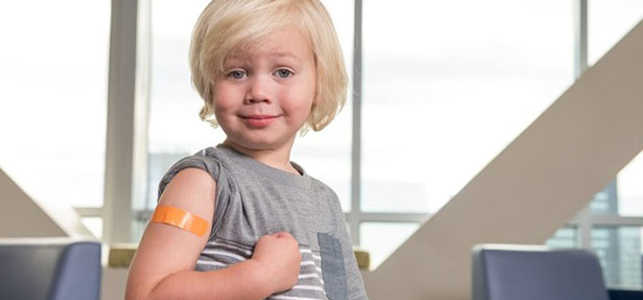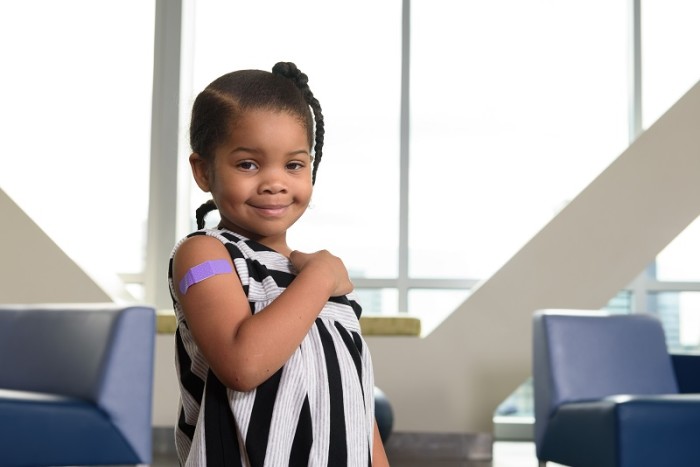
Vaccines: What you should know
The COVID vaccine has been front and center in recent months. While infants and kids under 12 can’t get it quite yet, there are many safe and important vaccines they SHOULD get.
The first vaccine was developed in 1796 by Edward Jenner for smallpox – this was done by taking fluid from a blister of someone infected and injecting it into another person’s skin (YUCK!). We have come a long way since that time with our knowledge about vaccination and how to make vaccines safe.
Why are vaccines important?
- Vaccines protect children against 16 diseases that can have permanent effects. Each of the recommended vaccines plays a crucial role in protecting a child from these serious diseases.
- Most vaccines are over 90 percent effective at preventing disease.
- Some diseases such as hepatitis B, chickenpox, pertussis (whooping cough), influenza, pneumococcus and tetanus are very common and germs from these diseases are present in our environment all around us. To not get a vaccine for one of these diseases puts children at very real risk of catching that disease.

- Other diseases happen less often in the United States but can quickly spread or cause an outbreak affecting many, particularly measles, mumps and Haemophilus influenza disease.
- And still others, including polio, rubella and diphtheria, have been eliminated from the United States but not from the rest of the world and because of international travel, we still need to protect ourselves.
- It is important for all of us to get vaccinated to stay safe ourselves and to keep people safe who may not be able to receive a vaccine due to serious medical issues – like someone who is being treated for cancer or whose immune system doesn’t work.
How do we know vaccines are safe?
- Before a vaccine is available to be used, it has been rigorously studied by the U.S. Food and Drug Administration to ensure that it is safe and effective. The FDA also follows up to make sure that the vaccine continues to be available for the public at the quantities needed and there are no shortages.
- After a vaccine is released, physicians and scientists worldwide continue to monitor for any previously unknown side effects via the Vaccine Adverse Event Reporting System. Any symptom a family or provider notices at the time when a vaccine is given is reported to ensure continued safety.
Are there side effects of vaccines?
Keep in mind, vaccines are medicines and no medication is 100 percent without side effects. Any time we take a medicine there is a risk we could have an allergic reaction to it or to something that it’s made of. It is RARE for a side effect of a vaccine to be serious. Most commonly with vaccines, side effects are pain, redness or swelling at the site of the injection. For little ones, this can mean that they are slightly more irritable or may run a low-grade fever.
How can parents help make the vaccination process less stressful?
Read up: Look up vaccines your child is due for on the Center for Disease Control website. Making sure children receive their vaccines at the age they’re recommended offers the best protection.
Bring comfort items to your child’s appointment: A toy, blankie, book or other favorite will go a long way.
Be honest: Use a calm and reassuring voice and simple terms to let them know what to expect.
Stay happy and relaxed: Your mood affects their mood! Let them know that everything is okay.
Distract your child: Sing their favorite song or be silly to draw their attention away from the vaccine.
Swaddle babies: Swaddle your infant after the vaccines are completed to help mimic the womb and put them at ease.
Breathing: Big kids need help calming down too – take deep breaths with them to help with relaxing before vaccines or try other calm breathing techniques. You can also distract them by pointing out things in the room or telling them a silly story.
After the vaccines: Mild reactions such as pain, redness or swelling at the site of the injection, rash, or fevers can happen. They are normal and will resolve soon. You can use a cool, wet cloth to ease redness, soreness or swelling at the spot where the vaccine was given. Ask your doctor before giving any medication to your child or if there are any concerns you have.
Know what vaccines your child needs when
The American Academy of Pediatrics immunization schedule now routinely recommends the HPV vaccine for 11 to 12-year-old girls AND boys. In fact, new vaccine requirements for schools include HPV and meningococcal vaccines – an important update for parents who may have opted out in the past. Talk to your child’s pediatrician or primary care provider to make sure all their vaccines are up to date.
